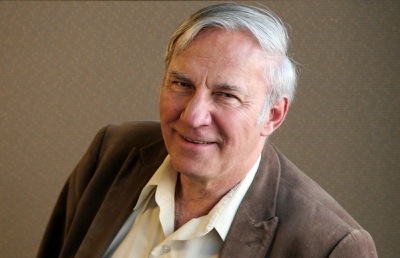Saturday, April 17, 2010 | 2:01 a.m.
Sun coverage
Related Archives
- Yucca Mountain dump opponents see their momentum ebb (4-13-2010)
- Group calls on Congress to keep Yucca Mountain alive (3-22-2010)
- Yucca Mountain foes hail historic step to kill nuclear waste depository (3-4-2010)
- Energy Department withdraws application for Yucca Mountain (3-3-2010)
- In Nevada, nuclear raises touchy issues (11-14-2009)
Many Nevadans are passionate about nuclear energy.
The state’s population overwhelmingly opposes the planned nuclear waste dump at Yucca Mountain.
But hundreds of miles north of the mountain, up in the meadows of Sparks, is a man dedicated to changing Nevadans’ thinking on nuclear energy.
Gary Duarte is more than a cheerleader for nuclear energy. He’s its proselytizer.
As the founder of the U.S. Nuclear Energy Foundation, a small pronuclear nonprofit organization, he has traveled to Elks lodges and chambers of commerce in small towns across the West preaching the benefits of nuclear energy. Now, he’s also running on the Republican ticket for the Assembly seat in Washoe County District 31, which will open up when Democrat Bernie Anderson is term-limited out at the end of this year.
Duarte, a 63-year-old retired publishing entrepreneur, wants to see nuclear power plants built in Nevada.
“All of our group’s directive and mission is based around common sense, logic and deductive reasoning,” Duarte says. “This is the best option for our country’s future. It won’t pollute the air, it can help break our dependence on foreign oil, and it can provide the energy that’s going to be needed to keep this country progressing.”
As far as the deadly nuclear waste that reactors generate, Duarte says the country is just going to have to recycle it like the rest of the developed world.
“It’s the only logical way to deal with it,” he says.
Nuclear experts and researchers say Nevada may not have a suitable site for nuclear reprocessing, however, because it lacks water. And on top of that, reprocessing is still far too expensive to be undertaken without heavy government subsidies.
Duarte contends that Nevadans are just confused by the highfalutin talk of anti-Yucca Mountain lobbyists, nuclear watchdog groups and industry representatives. He says they talk people in circles and scare them unnecessarily.
That’s one reason you’ll find no nuclear physicists among the group’s ranks. In fact, none of the members of his organization has any experience with nuclear power at all — no scientists, no nuclear technicians, not even an electrician are to be found among the half dozen members.
They’re usually not eyed as shills for the industry because they’re not funded by the industry, Duarte says. They pay for most of their travel expenses out of their own pockets. For most, this is a retirement hobby, an alternative to refinishing antiques or taking up golf.
“I think part of the reason why we have a pretty good dialogue with citizens is because we’re not nuclear experts,” Duarte says. “We’ve done some research, we accumulate information from the (U.S.) Department of Energy and the power companies and nuclear manufacturers, and then we try to relate that data in a method the average person can understand. We think there’s a communication gap between the science and Joe Citizen. We’re trying to fill it.”
It’s that kind of statement that makes Duarte a headache for anti-nuclear activists.
Nuclear energy is an extremely complicated subject, and they fear he may be oversimplifying and whitewashing an industry that can be deadly for neighbors.
They point to major disasters like the explosion in April 1986 in Chernobyl, the 1979 Three Mile Island accident in which a Pennsylvania reactor experienced a partial core meltdown, and the recent headlines from Vermont, where a nuclear reactor was found to have leaked radioactive waste into the soil and water table. About 20 aging U.S. reactors are dealing with underground leaks similar to those in the Vermont plant.
None of that is keeping Duarte and members of his group from traveling the West riling up economically devastated small towns, convincing at least some that nuclear energy might be a savior for their communities. For example, he is the man behind Ely’s recent interest in hosting a nuclear power plant.
Most cities Duarte visits haven’t got a proton-sized chance of getting a nuclear plant. A nuclear reactor needs a market for the electricity, adequate transmission lines and a water supply of tens of thousands of gallons a day. Most cities to which Duarte has carried his “go nuke” message can’t fulfill those requirements.
This is somewhat annoying for nuclear power plant developers, who are flooded with calls from small-town business and civic leaders almost every time Duarte makes a pitch stop.
Sometimes they do produce a possible lead, however, says Mike McGough, a senior vice president of UniStar Nuclear Energy, a nuclear developer that has expressed interest in building a plant in Ely if the town can come up with the water the plant would need. “A lot of these towns that were slated for coal plants are now coming to nuclear,” McGough says. “Some of them are a perfect fit for nuclear power. They’ve got the (market for the electricity), they’ve got water and they’ve got public support.”
Groups like Duarte’s are handy with the public support, McGough says.


Join the Discussion:
Check this out for a full explanation of our conversion to the LiveFyre commenting system and instructions on how to sign up for an account.
Full comments policy